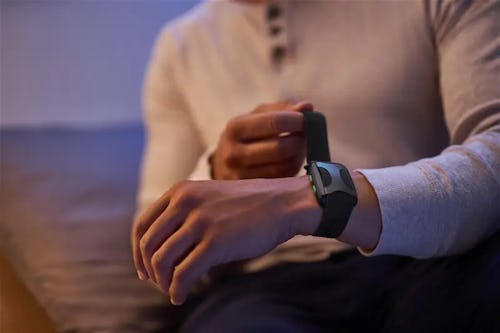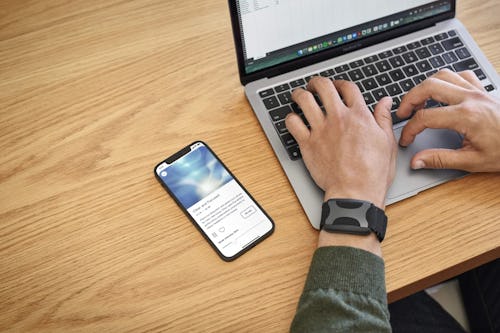
While many people wear health trackers these days — maybe you’ve got one on right now — the Apollo wearable is uniquely designed by neuroscientists and physicians to help you sleep, relax, and focus. The technology was originally developed through the research of David Rabin, MD, Ph.D., whose career has focused on the effects of chronic stress on overall health. The result? A compact device you can wear on your wrist or ankle (or clip onto your clothing) that sends soothing vibrations to help build your resilience to stress.

How does it work?
An overactive fight-or-flight response can cause stress hormones such as adrenaline and cortisol to remain elevated, and chronic stress may lead to sleep problems, impaired memory and concentration, anxiety, and more.
The Apollo wearable helps to improve your body’s response to stress thanks to touch receptors in the skin which send signals to the emotional cortex in your brain. According to Apollo Neuro, your body responds to these signals the way it would to a cozy hug, snuggle, or bubble bath. And during various clinical trials, users experienced averages of 40% less stress and anxiety and a 19% increase in deep sleep. (Keep scrolling for more clinical trial results.)
As you wear the Apollo device over time, it may improve your heart rate variability (HRV), which can help you feel less stressed.
However, according to BDG editor Danielle Kraese, wearing the device consistently is easy to do. “I’d never tried a wearable before the Apollo, so I wasn’t sure if I’d be able to get in the habit of wearing one every day. But putting it on in the morning immediately felt like a nice little ritual (and it helps that it’s so lightweight — I can barely feel it),” she says. “Also, the brand’s claim that you’ll eventually stop noticing the vibrations is true! After only a few days of wearing the Apollo, I kept having to periodically touch my wrist to make sure it was really on which is still amazing to me.” But this device is not a quick fix for stress relief; according to Apollo Neuro, you should wear it consistently for a minimum of three hours a day, five days a week to get started.

The app
In the free Apollo Neuro app, you’ll be able to choose from seven different modes depending on your goals like Sleep and Renew, Clear and Focused, and Social and Open. You can set the desired duration and intensity of the vibrations and even create a custom schedule that’ll automatically change the modes based on the time of day. Overall, according to Apollo user Kelly H., the device is “worth every penny.”

The device
The Apollo wearable is a bit of an investment, but it comes with the device, a bracelet, a clip for attaching it to your clothing, and a micro USB charger. The bracelet is made of a soft yet durable polyester/neoprene material that’s comfortable and functional, and the clip is made from sturdy polycarbonate plastic to stand up to daily wear. Extra clips and bands are available, too.
According to one reviewer: “The specific things Apollo has helped me with are anxiety, concentration and socializing. I feel more outgoing and unaffected by social anxiety when I wear it. I’ve also noticed an uptick in productivity especially on days I do computer work. It’s a wonderful tool if you are affected by anxiety and distractions.” — Sandra H.
Colors: 6 | Band sizes: Small, Medium, Large
The clinical trials
Multiple trials have shown positive effects from consistent use of the wearable, including a sleep study that demonstrated these results on average:
- 14% increase in REM sleep
- 19% increase in deep sleep
- 6% increase in total sleep time
- 11% increase in heart rate variability (HRV)
- 4% decrease in resting heart rate
Other studies have also shown promising averages:
- 40% less stress and anxiety
- Up to 25% increase in focus and concentration







